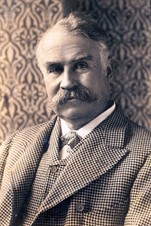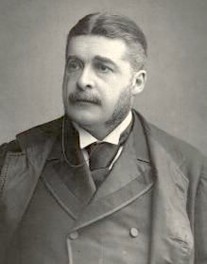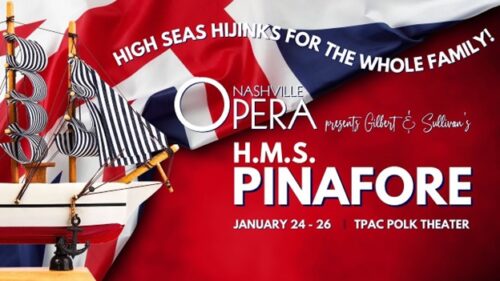Coming to the Nashville Opera
H.M.S. Pinafore to Set Sail!
As the Nashville Opera prepares to stage H.M.S. Pinafore (formally titled H.M.S. Pinafore; or, The Lass That Loved a Sailor), the Music City Review is happy to offer a preview of this early gem from the Gilbert and Sullivan canon. Premiered May 25, 1878, Pinafore marks a significant milestone in the creative duos’ collaboration, showcasing their developing style that would come to define English comic opera and the eventual early-American stage.[1]
The comedic ethos of H.M.S. Pinafore draws heavily from poet and librettist William S. Gilbert’s (1836–1911) earlier work, namely his “Bab Ballads”—or the collection of whimsical verses he penned under the pseudonym “Bab”—published in the British humor magazine, aptly called Fun, during the latter half of the nineteenth century. These “Bab Ballads” provided a rich repository of characters, situations, and a clever brand of wordplay that Gilbert would later adapt well for the stage.[2] A good example is Pinafore’s “For He is an Englishman.” An excerpt:
For he might have been a Roosian,
A French, or Turk, or Proosian,
Or perhaps Italian
But in spite of all temptations
To belong to other nations,
He remains an Englishman!
The lyrics exemplifies Gilbert’s prowess of satirical wit, prioritizing linguistic dexterity over plot advancement. The song’s clever construction works on multiple levels, combining rhyme, rhythmic cadence, and playful word pronunciations—such as “Roosian” for Russian and “Proosian” for Prussian. The result is a chirpy, fun, and humorously illogical experience for which Gilbert and Sullivan’s unique style became widely known. More broadly, the example conveys an absurdist logic, suggesting that one’s nationality is a choice, poking fun at the exceptionalism prevalent in British Victorian society, while remaining innocent and retaining the song’s accessibility for audiences to enjoy.

Pinafore’s musical numbers offer comic relief while characterizing whoever is singing at the given moment. They reveal a glowing sense of nineteenth-century British national pride even as it satirizes it, demonstrating how Pinafore conveys complex ideas through a collection of silly songs. Gilbert and Sullivan’s use of immediate humor grants audiences’ permission to safely participate in the criticism of societal norms, which highlights the creative duo’s skills in joining humor with intellectual critique.[3]
Pinafore’s plot, while seemingly simple, cleverly subverts expectations of Victorian-era class and propriety. The love story between Ralph, a common sailor, and Josephine, the captain’s daughter, serves as a conduit to explore matters of social climbing and the arbitrariness of hierarchical status. The character of Sir Joseph Porter, the First Lord of the Admiralty, who got his position without ever having been to sea, is a blatant censure of bureaucracy and the power of privilege over merit.

While we have talked a lot about Gilbert, H.M.S. Pinafore marks a pivotal moment in Sullivan’s (Sir Arthur S. Sullivan, 1842–1900) evolution as a light opera composer. While the score still echoes elements of European operetta, it also heralds the emergence of a uniquely English musical voice. Sullivan skillfully intertwines traces of sea shanties and patriotic melodies, creating a distinctive sound. Pinafore’s musical repertoire spans from stirring ensemble pieces to delicate romantic duets, with each composition meticulously designed to complement Gilbert’s witty lyrics and give a sense of forward narrative motion. This careful balance of musical innovation and narrative support in H.M.S. Pinafore showcases Sullivan’s growing proficiency of the genre.[4]
A contemporary review from June 2, 1878 conveys Pinafore’s appeal expressed from both contemporary and current audiences: “They may laugh to their hearts’ content, and not be ashamed of what they are laughing at, as we shall now attempt to prove.”[5] Pinafore‘s incisive look at rigid class divides and unearned privilege still resonates today. In many ways, Pinafore paved the way for modern musical theater, proving that popular entertainment can showcase sharp social commentary without compromising its artistic merit. Gilbert and Sullivan masterfully blend humor and substance, creating a work that entertains while also challenging the status quo.
H.M.S. Pinafore—directed by Emily Pulley, conducted by Dean Williamson, and featuring the Nashville Opera—will run for three performances: January 24th and 25th, starting at 7:30 p.m. and a Sunday matinee on January 26th at 3:00 p.m. It will be performed at the Polk Theater in the Tennessee Performing Arts Center (TPAC) downtown, located at 505 Deaderick St.; Nashville, TN 37243. For further information about the Nashville Opera and this and other upcoming productions, visit their website at https://www.nashvilleopera.org/pinafore
[1] “The Beginner’s Guide to Gilbert and Sullivan,” English National Opera, 2025, https://www.eno.org/discover-opera/the-beginners-guide-to-gilbert-sullivan/. Accessed: Jan. 10, 2025.
[2] Jim Farron, “The Bab Ballads by W.S. Gilbert,” Gilbert and Sullivan Archive, Oct. 5, 2011, https://gsarchive.net/bab_ballads/bab_home.html. Accessed: Jan. 10, 2025.
[3] “The Beginner’s Guide….;” Farron.
[4] “Beginner’s Guide to H.M.S. Pinafore Songs,” English National Opera, 2025, https://www.eno.org/discover-opera/explore-more/beginners-guide-to-hms-pinafore-songs/. Accessed: Jan. 10, 2025.
[5] Sunday, June 2, 1878 review of H.M.S. Pinafore in London’s The Era; “First Night Reviews,” Gilbert and Sullivan Archive, Mar. 29, 2010, https://gsarchive.net/pinafore/reviews/op_com1878-80/era6-78.html. Accessed: Jan. 10, 2025.




